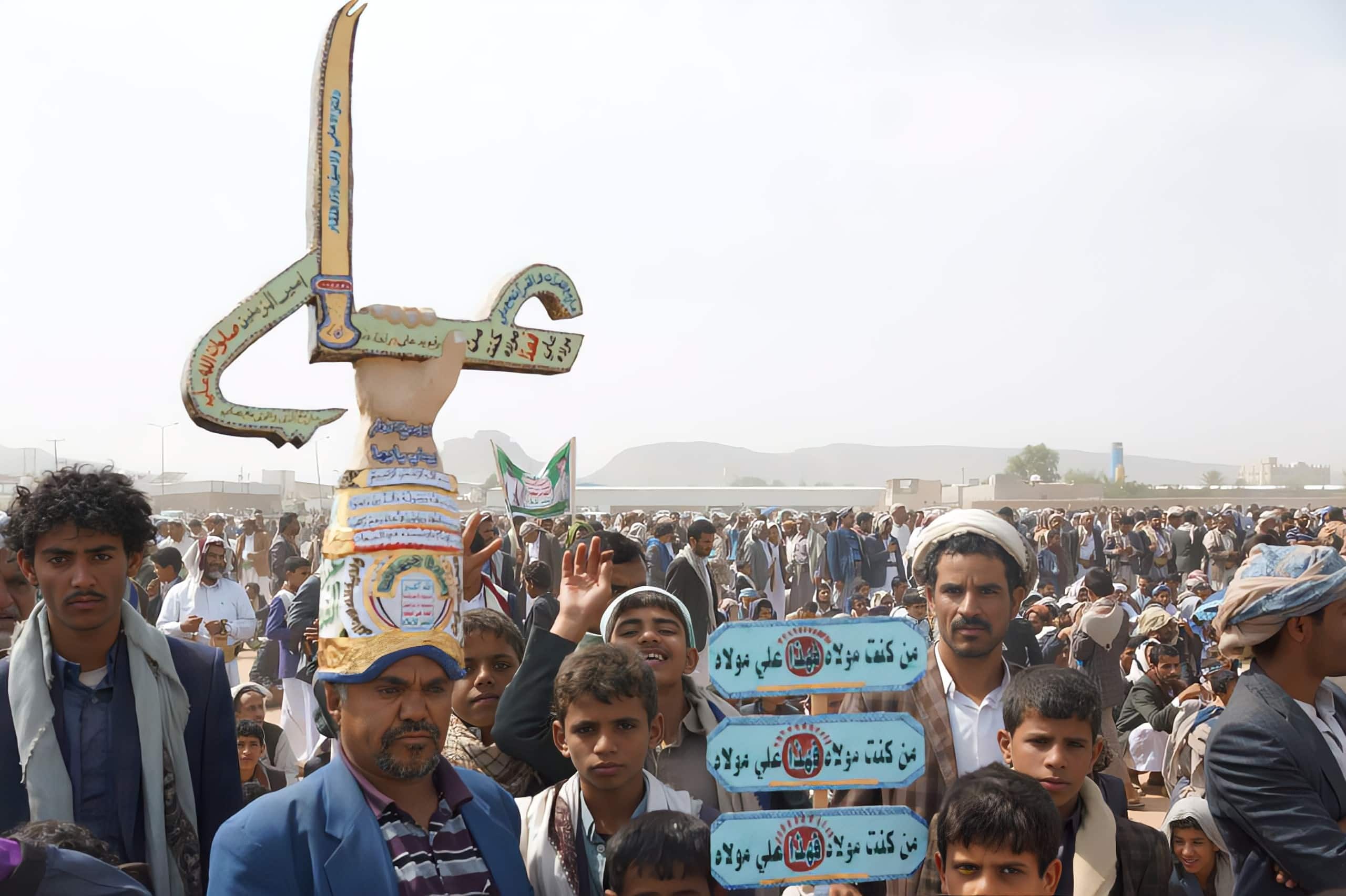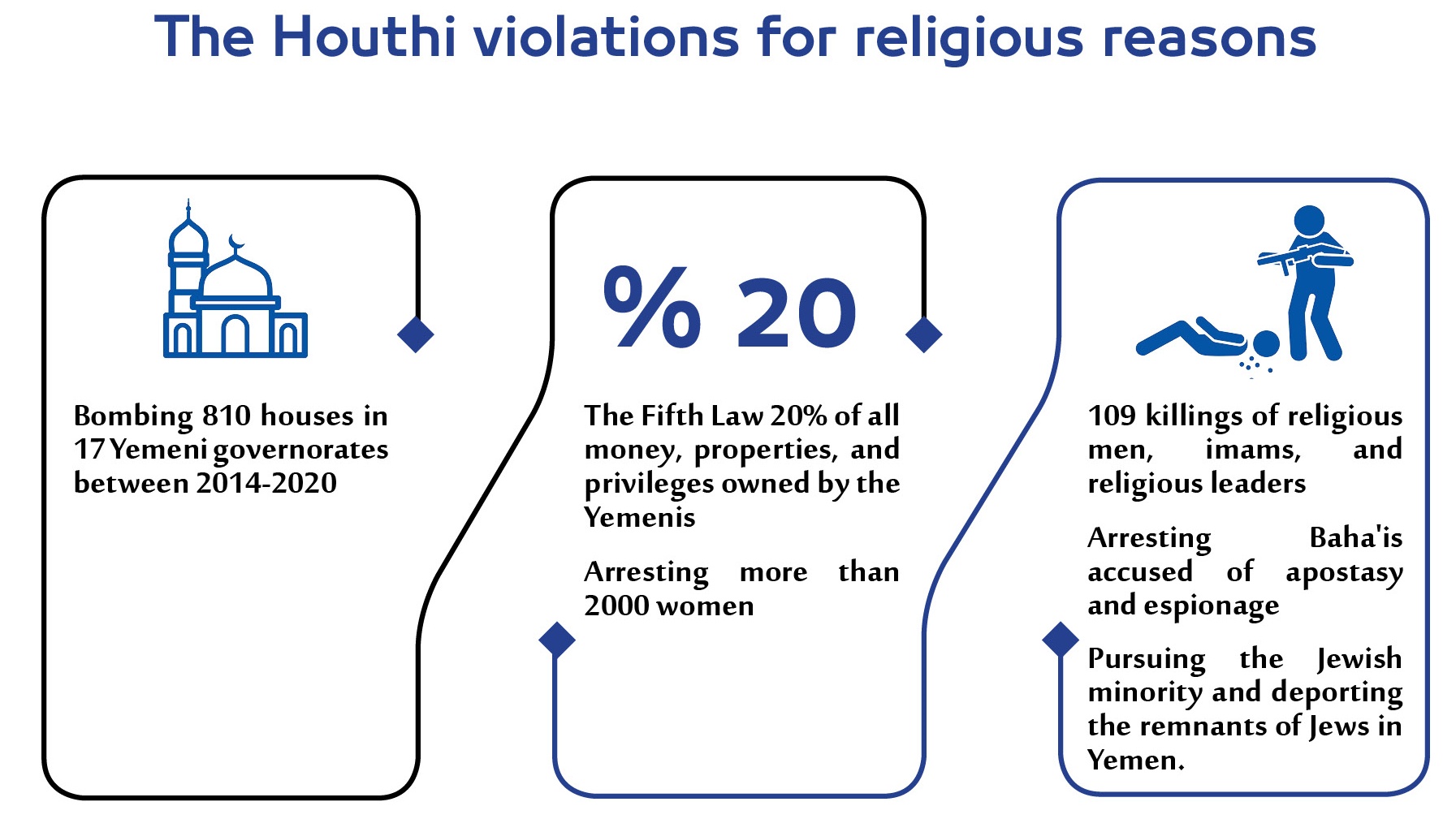
Cover photo: Houthi supporters on (Walayat Day), Rada'a district in Al-Bayda, August 2018 - the group's Al-Thawra newspaper
Last updated on: 17-08-2023 at 5 PM Aden Time

South24 Center (Cairo)
A political paper issued by “South24 Center” warned of the hazards related to the Houthi adherence to their theory of “divine right” to rule on the future of the peace process in Yemen. It also highlighted the implications of enhancing ethnic-based “racism” on citizenship equality, transitional justice, and human rights principles.
The paper, authored by "South24 Center" researcher Farida Ahmed, said: "It is important that the Houthis issue a document in which they renounce the concept of the ‘two lineages’ and ‘divine right to rule’ as well as their notion of racial superiority, as a condition for governance. This would serve as a prelude for them to enter a peace process that guarantees equal political rights for all citizens".
Furthermore, the paper recommended that "the outcomes of any peace process should include constitutional guarantees that criminalize claiming political privileges on the basis of race. It is also important that the political agreement to ensure citizenship equality conditions should have the signatures of all parties to the conflict, foremost of whom are the Houthis".
The paper "is an attempt to highlight the possibility of reaching a sustainable and resilient peace amid the Houthi adherence to their “divine right” to rule, especially If the internationally-recognized government in Yemen (IRGY) engages with the Houthis for a comprehensive political settlement, it should set forth conditions related to citizenship equality".
The paper explored the opinions of some Yemeni male and female researchers specializing in the local community and minority affairs in addition to some representatives of the religious minorities who accuse the Houthis of committing wide violations against their religious sects.
The author stressed the need to put in place strict laws that prevent reprisals on the basis of race without damaging the principle of transitional justice. There are accumulated violations by the Houthi policies which harmed many people on the ground. This has created a building up of resentment within a wide section against certain lineages and vice versa. Therefore, it is important to criminalize violators and to hold them accountable through the judiciary and transitional justice institutions".

She urged that "education curricula in the Houthi areas should be amended, especially as they attempted to spread the idea of ethnic differentiation among a large number of children in schools, scientific institutions, and summer camps".
According to the paper, there is no exaggeration in saying that the Houthi coup against the state isn't the main dilemma in Yemen. The dilemma is the permanence of the Houthi idea related to the divine right to rule. There have been many coups throughout modern history that led to ideas being strengthened and ideologies dying out and vice versa. However, it seems that the dispute in Yemen is a very complicated matter, especially as it is related to the Houthi fanaticism regarding their race and placing an aura of sanctity over it. They take this as allowing them to control everything in the light of their notion of the divine right. They have thus erected many barriers between themselves and the rest of the people. This is not only related to the fanaticism of the group itself. It is also linked to the presence of a significant percentage in Yemen who serve the idea of “sanctifying the Hashemite race”, even though they don’t belong to it. They accept the sanctification of the Houthis’ notion of divine right, along with "ethnic discrimination" and "dynasty". This is a major dilemma that cannot be resolved without mandatory constitutional laws for citizens encompassing all their differences. This would guarantee accepting the concepts of democracy, general elections, and popular will. These will serve as the determinants to achieve institutional governance which is not based on claims of divine rights”.
It added: “There is no exaggeration in saying that the Houthi coup against the state isn't the main dilemma in Yemen. The dilemma is the permanence of the Houthi idea related to the divine right to rule. There have been many coups throughout modern history that led to ideas being strengthened and ideologies dying out and vice versa. However, it seems that the dispute in Yemen is a very complicated matter, especially as it is related to the Houthi fanaticism regarding their race and placing an aura of sanctity over it. They take this as allowing them to control everything in the light of their notion of the divine right. They have thus erected many barriers between themselves and the rest of the people. This is not only related to the fanaticism of the group itself. It is also linked to the presence of a significant percentage in Yemen who serve the idea of “sanctifying the Hashemite race”, even though they don’t belong to it. They accept the sanctification of the Houthis’ notion of divine right, along with "ethnic discrimination" and "dynasty". This is a major dilemma that cannot be resolved without mandatory constitutional laws for citizens encompassing all their differences. This would guarantee accepting the concepts of democracy, general elections, and popular will. These will serve as the determinants to achieve institutional governance which is not based on claims of divine rights”.
Therefore, the paper urged the Internationally-recognized government to set a precondition that Houthi leader, Abdulmalik Al-Houthi, must leave Yemen, especially as his followers believe in his "divine right to rule". Since 2004, there have been generations of Houthis who have been brought up on this notion of devoutness. The continuous presence in Yemen of who they consider as the ruler and the religious reverence associated with him, may endanger the issue of peace in Yemen.
On the other hand, the paper called to set a precondition for the return of minorities who were deported by the Houthis and prevent any harm caused to them. These legislations should guarantee all their rights, including enjoying their own cultures or professing their religion or performing their religious rites. Additionally, they must be compensated for the moral and material harm they suffered, as per the principles of transitional justice.
Any political agreement, according to the paper, should include women's rights and freedoms and ensure that they won’t be subjected to any discrimination based on gender under religious and sectarian pretexts. They have to be guaranteed the right of political participation by the different parties of the conflict in Yemen.
It concluded: “There is a need to support and encourage local initiatives working towards enhancing toleration, accepting coexistence, and nonviolence. This would help in merging those who suffered from religious or ethnic discrimination with the community again”.